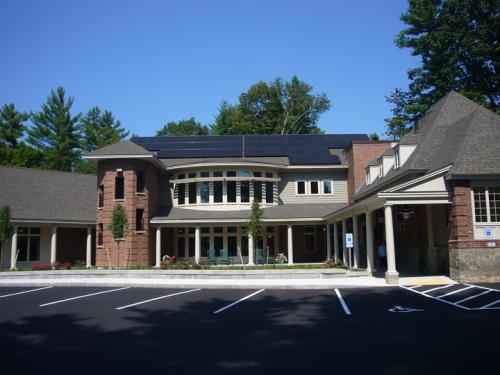Net Metering in the State of New Hampshire

In the past ten years residential energy prices have increased by close to 10% (US Energy Information Administration) and electric rates in NH are now the 7th highest in the nation[1]. Choosing to be conscious about energy consumption and energy efficiency is just one way to combat rising energy prices. There are many changes that residents, towns, businesses, and other entities can make to not only save money on energy costs, but to minimize their impact on the environment.
One alternative that communities in the Strafford region are exploring and utilizing is solar energy. In 2013, the Town of Durham installed solar panels to help power the town’s municipal buildings. Durham has also installed solar panels in multiple locations across town including the Churchill Ice Rink, the Town Library, and the Fire and Police Stations. In addition, close to 40 residents have chosen to install solar photovoltaic (PV) energy systems for their own residential use. To date, the town has generated over 100kWH of energy from these installations.  In October 2015, the Town Council approved the installation of a solar array (or solar gardens) at the Packer’s Falls Gravel Pit in Lee, which is owned by the Town. Many other towns and cities in the region are installing similar solar gardens as well, including Dover, Newmarket, Rochester, Northwood, and Milton. The City of Somersworth has also explored the idea of solar. The City has been planning a community solar project that would potentially be built on the site of the old Somersworth Sanitary Landfill.
The Public Utilities Commission in New Hampshire currently offers incentives and rebates for residents and businesses looking to utilize solar energy. The U.S. Department of Energy has developed a useful tool which identifies these incentives in each state.
The State of New Hampshire also authorizes electric utilities to accept “net metering†from residential and commercial customers. Net metering essentially provides a monetary credit to the generator when excess power via wind, solar, and other sources is metered back to the utility company. This billing mechanism has recently been in the spotlight with regards to the value of these energy credits and fair share costs the utility companies have in maintaining and building the grid. In addition, the state legislators many years ago established a 50 MW cap on the creation of renewable energy in the state split among all the utility companies.
As explained in an article by NextGen Climate, an environmental advocacy organization, the current 50 MW cap translates into only 2% of the state’s peak energy load being supplemented by renewable energy. With the proposed increase, more renewable energy could be generated in the state. With the increasing popularity and demand for renewable energy, this cap has been exceeded and the development of future renewable energy in NH is now at risk. Recently several bills have been introduced, primarily SB 333 and HB 1116, which each propose to increase the cap from 50 to 75 MWs to allow for the production of renewable energy in NH while the PUC determines what values should be established for the net metering credits in the future. Specifically the net metering laws currently allow those who generate up to 100 kW in excess of their energy needs (for residential and small commercial customers) and up to 1,000 kW (larger commercial customers) of renewable energy (via wind, solar, etc.) to sell the excess energy they have produced back to the energy companies to be used by other customers. This is reflected with credit on their energy bills, or actual cash value if energy generation exceeds energy consumption (see NH Sustainable Energy Association’s Guide to Community Energy and Group Net Metering for more information.)
For more information on the state’s policies on net metering visit https://www.puc.nh.gov/Sustainable%20Energy/Net%20Metering/Net_Metering.html.
Resources
[1]Energy Information Adminstration- sourced from http://www.neo.ne.gov/statshtml/204/204_2014.htm
This blog was written with review and input from Jack Munn, Chief Planner at Southern NH Planning Commission.
